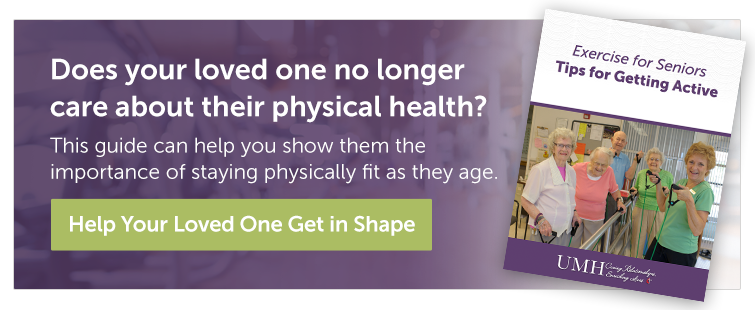How Healthy Is Your Loved One? Health Tips for Seniors
Health is undoubtedly every individual’s number one priority. It is essential to pay attention to your health restrictions, eat healthy and exercise.
Assisted living communities offer programs to meet dietary restrictions and preferences as well as varied exercise programs and classes that cater to all residents’ wants and needs. As individuals grow older, proper health care and a healthy lifestyle becomes even more important.
It's the perfect time to focus on informing yourself of the importance of healthy food choices and lifestyle changes. Forty years ago, The Academy of Nutrition and Dietetics named March as National Nutrition Month to "focus attention on the importance of making informed food choices and developing sound eating and physical activity habits."
Total nutrition improvement is important to anyone, but especially important to seniors. Great senior nutrition lays the foundation for total physical and mental health and happiness. At UMH assisted living communities, we're always trying to encourage and help our residents practice healthy habits.
In the spirit of raising awareness for healthy actions, we've put together a couple of tips to help seniors practice better lifestyle choices.
Food Health Tips for Seniors
Eating a balanced diet that brings together items from all of the major food groups is key to maintaining good health and protecting against potential decline. Finding an assisted living community that offers a varied menu that meets your health care needs and personal preferences should be an important part of what you are looking for as you search for the right place for you or your loved one.
1. Calcium
Calcium is especially crucial in older adults, as it strengthens bones and helps to prevent osteoporosis and fractures. Bone loss occurs at a faster rate as we age, and it is important to meet your recommended needs of this vital mineral. Great dietary sources include low-fat dairy products such as milk and yogurt, green leafy vegetables, sardines, canned salmon with the bones, beans, dried peas, and calcium fortified foods such as orange juice. Daily Recommendation: Females (51+) - 1200 mg/day Males (51-70) – 1000 mg/day, (71+) – 1200mg/d
2. Vitamin D
Vitamin D and calcium go hand-in-hand, because this vitamin is needed for calcium to be absorbed in our bodies. Therefore, it is not helpful to increase calcium intake without also getting your recommended needs for Vitamin D. Food sources include milk, eggs, fatty fish such as tuna, salmon, and mackerel, as well as fortified cereals and other products such as yogurt and orange juice. Your body makes its own Vitamin D when skin is exposed to the sun, so getting outside when possible for 15-20 minutes can also be very helpful! Taking a Vitamin D3 supplement may be necessary to ensure adequate intake. Daily Recommendation: Males & Females (51-70) – 15 mcg; (71+) – 20 mcg
3. Fish and Other Sources of Protein
Getting insufficient protein can result in the breakdown of body tissue. Although eating too much red meat is problematic; fish, chicken and beans are also excellent sources of protein.
4. Plant-Rich Nutrients – Vitamin A, C, E, K, & Potassium
These nutrients found in a plant rich diet will help to decrease the risk of high blood pressure, cancer, stroke, cardiovascular disease, and diabetes. By ensuring a colorful intake of at least 3 servings of vegetables and 2 servings of fruit per day, your body will be replenished with vitamins, minerals, anti-oxidants, and phytochemicals to keep your cells healthy. Increasing your intake of whole grains and healthy fats such as nut butters and vegetable oils will also provide you with rich sources of Vitamin E.
5. Tea
Hot tea possesses anti-oxidant properties that can help reduce the chances of cancer and other diseases. Furthermore, a cup of tea in the morning can provide the same simulative benefits as a cup of coffee.
6. Protein & Iron
As we age, we lose lean muscle mass. In order to continue to build upon muscle mass it is important to stay active and include 2-3 servings of protein-rich foods in your daily diet. Examples include meat, poultry, fish, eggs, beans, nuts, nut butters, dried peas, lentils, and seeds. These along with whole grains, iron-fortified cereals, and leafy green vegetables are also great sources of iron necessary to keep your energy up and your red blood cells healthy!
7. Fiber
Fiber is important for a healthy digestive system and promotes heart health. Aim for 20-35g of fiber per day, consuming foods such as legumes, whole grains, fruits, and vegetables.
8. Vitamin B12
Vitamin B12 deficiency becomes more common with increasing age. This vitamin is necessary for healthy red blood cells and nerve function. Animal products are rich in this vitamin such as meat, poultry, fish, eggs, and dairy, as well as fortified cereals. Discuss with your doctor whether B12 supplements or injections may be beneficial in order to prevent deficiency. Daily Recommendation: Males & Females (14+) – 2.4 mg
Physical Health Tips for Seniors
Why does healthy aging appear to be more the exception rather than the rule? Well, one reason is society has been programmed to think that aging and debilitating diseases are forever intertwined. A second reason is the western lifestyle equation: too little exercise and too much sugar and fat in the diet.
People are also more likely to exercise and diet when they are younger than when they are older (another programmed mindset?). Taking care of your health doesn’t stop at age 50, 60 or even 90! Health and fitness have no age limit. It’s also no secret that nutrition and exercise are weapons against chronic diseases and hold the key to longevity. So why aren’t more of us on board?
1. Aerobic exercises
At least 2.5 hours a week of moderate to vigorous exercise is recommended to increase heart rate. Being older, it is important for seniors to start slowly and be aware of limits as to not over-exert themselves.
2. Strength exercises
Strength sessions up to twice a week will improve posture and balance. Physical activity is beneficial to senior health, but can also be a great way to add social time to the day. Try lifting light weights with friends or family to get everyone involved!
Mounting studies have shown it’s never too late to be health conscious and reap the benefits.
Studies also show that if you exercise (walking, yard chores, stretches, etc.) and eat wholesomely 70% of the time, you elevate the building blocks to healthy aging. The good news is many residents of independent living and assisted living communities already have the potential (and rich environment) for aging well. So, make senior health and fitness a programmed part of your everyday activities!
If you want more information about how you can get active as a senior download our free guide "Exercise for Seniors: Tips for Getting Active."

About Chelsea Sayegh
I started working as a Marketing Coordinator for United Methodist Homes in October of 2016. I work on public relations, website management and community planning for their award winning independent and assisted living communities. As a graduate of Ursinus College with a degree in Media and Communications and a passion for serving nonprofits, United Methodist Homes has become my home away from home. I spend my days working in a community filled with smiling faces, helpful hands and wonderful residents. I have a passion for assisting seniors and take great pride in being able to promote a company with such a positive mission and values. As an individual committed to learning and growing, I have jumped right into this exciting career!

Our Blog is a 2016 Platinum Generations Award Winner! The Generations Award is an annual international competition for excellence in senior marketing recognizing professionals who have communicated to the 50+ Mature Markets.



